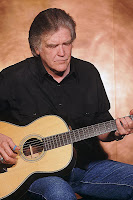VARIOUS ARTISTS
Note of Hope: Woody Guthrie and Rob Wasserman – a collaboration in words and music
429 Records
“The note of hope is the only note
That can keep us from falling to the bottom of the heap of evolution
Because, largely, about all a human being is anyway
Is just, a hoping machine.”
-Woody Guthrie, Notes About Music, 3/29/1946
During the almost-14-year run of the Folk Roots/Folk Branches radio show on CKUT in Montreal, I did a bunch of special programs devoted to the songs of Woody Guthrie.
Almost 11 years ago, on January 4, 2001, Nora Guthrie, Woody’s daughter and director of the Woody Guthrie Archives, joined me on one of those shows to talk about Woody, the archives and the various projects she had done, or had in the works, to bring the thousands of unheard songs in the archives to life.
One of the projects she mentioned was a multi-artist collection being spearheaded by the great bassist Rob Wasserman. I was already a big fan of Rob’s playing and of his Duets album for which he collaborated with a different artist on every track, so the Woody Guthrie project was something I quickly began looking forward to.
Years passed since that radio show. When I’d see Nora over the years, she’d tell me the project was still ongoing. Finally, Note of Hope is out, released in conjunction with celebration leading to the centennial of Woody’s birth on July 14, 2012.
Rob Wasserman’s bass playing is the heartbeat of this collection, and the soul is Woody Guthrie’s writings, dating from his New York – particularly Brooklyn – years of 1942 to 1954.
It’s an eclectic collection of artists and an eclectic range of material that Rob and Nora have assembled for Note of Hope. There are artists rooted in folk, rock, jazz and hip hop – or various combinations thereof – and the songs, mostly set to music by the individual artists themselves, or in collaboration with Rob, stretch far and away, both lyrically and musically, from the standard Woody Guthrie canon. In addition to having been a prolific songwriter, Woody was also a prolific prose writer and I'm sure some these pieces were not written as songs. Several of the most compelling tracks are performed as spoken word pieces with musical backing.
The spoken word tracks, and a couple of others that are kind of sung-spoken, remind me of Jack Kerouac’s recorded readings with musical backing.
Among the spoken word pieces is “Voice,” performed by Ani DiFranco, a Coney Island meditation on how it is not real, authentic, everyday people reflected in popular culture – something that’s not much different 60 or 70 years later.
Another is “I Heard a Man Talking,” a reading by the late Studs Terkel, the legendary Chicago radio interviewer and oral historian. The piece, written in 1943, is a story that could have come out of Kerouac’s On the Road, written almost a decade later. It makes me wonder if Kerouac’s stream-of-consciousness writing style was at least partially inspired by Woody’s writing.
And then there’s “There’s a Feeling in Music,” read by Pete Seeger on top of a banjo and bass arrangement composed and played Tony Trischka and Rob. Written in 1942 just two years after Woody and Pete met for the first time in New York City, it is a beautifully written rumination on why music and songs are so important and so much a part of our lives.
“The Debt I Owe,” set to music with some of his additional words by Lou Reed is almost a talking song too. The narrator walks around Coney Island – where Woody lived with wife Marjorie Mazia Guthrie and kids Arlo, Joady and Nora – ruminating on money troubles in a way that seems to so reflect the burdens of so many in our own 21st century economic crisis. But, there’s another layer to the song. The real debt is not about money, it’s about the times we’re living in – “the bell is ringing out danger,” Lou sings (and a line Lee Hays and Pete Seeger would use a few years later) – and the people we love and sometimes hurt, and owe so much to.
Other highlights include “Wild Card in the Hole,” set to music and sung by Madeleine Peyroux, another song that seems as reflective of our own times as of 1949 when Woody wrote the words; and “Old Folks,” set to music and sung by Nelly McKay, in which the narrator muses on the weariness and accomplishment of old age and the optimism of youth.
The finale, “You Know the Night,” set to music by Rob and Jackson Browne, and sung by Jackson, is an amazing 15-minute tour-de-force in which Woody vividly recalls the night he met Marjorie. Written in 1943, it almost presages songs like “Sad Eyed Lady of the Lowlands” that Bob Dylan would start writing two decades later.
The performing artists in this collection are of our time, but I never cease to be astounded how so much of Woody’s writings, from six or seven decades ago, seems to be as much, or more so, of our time as his.
--Mike Regenstreif










